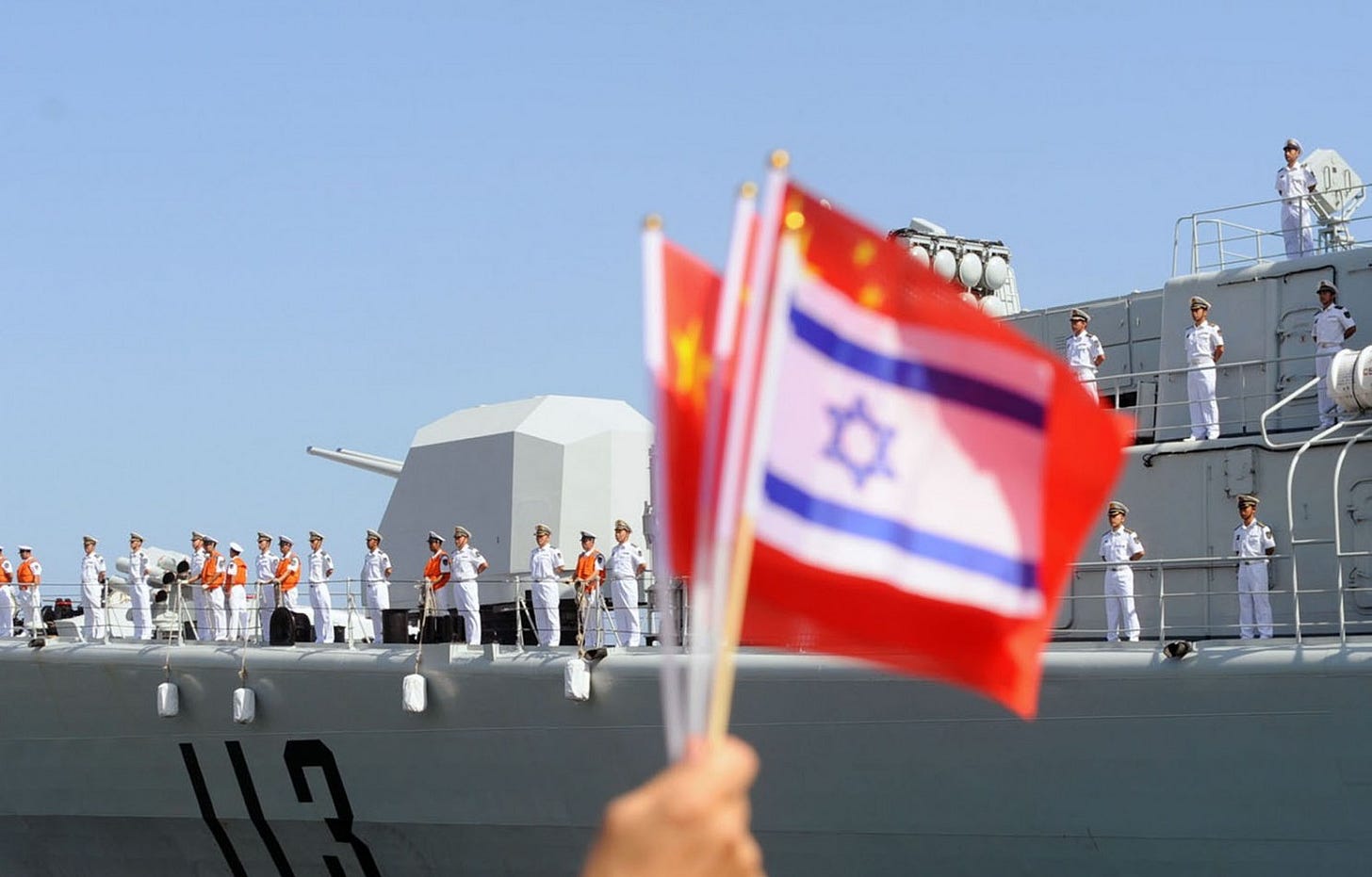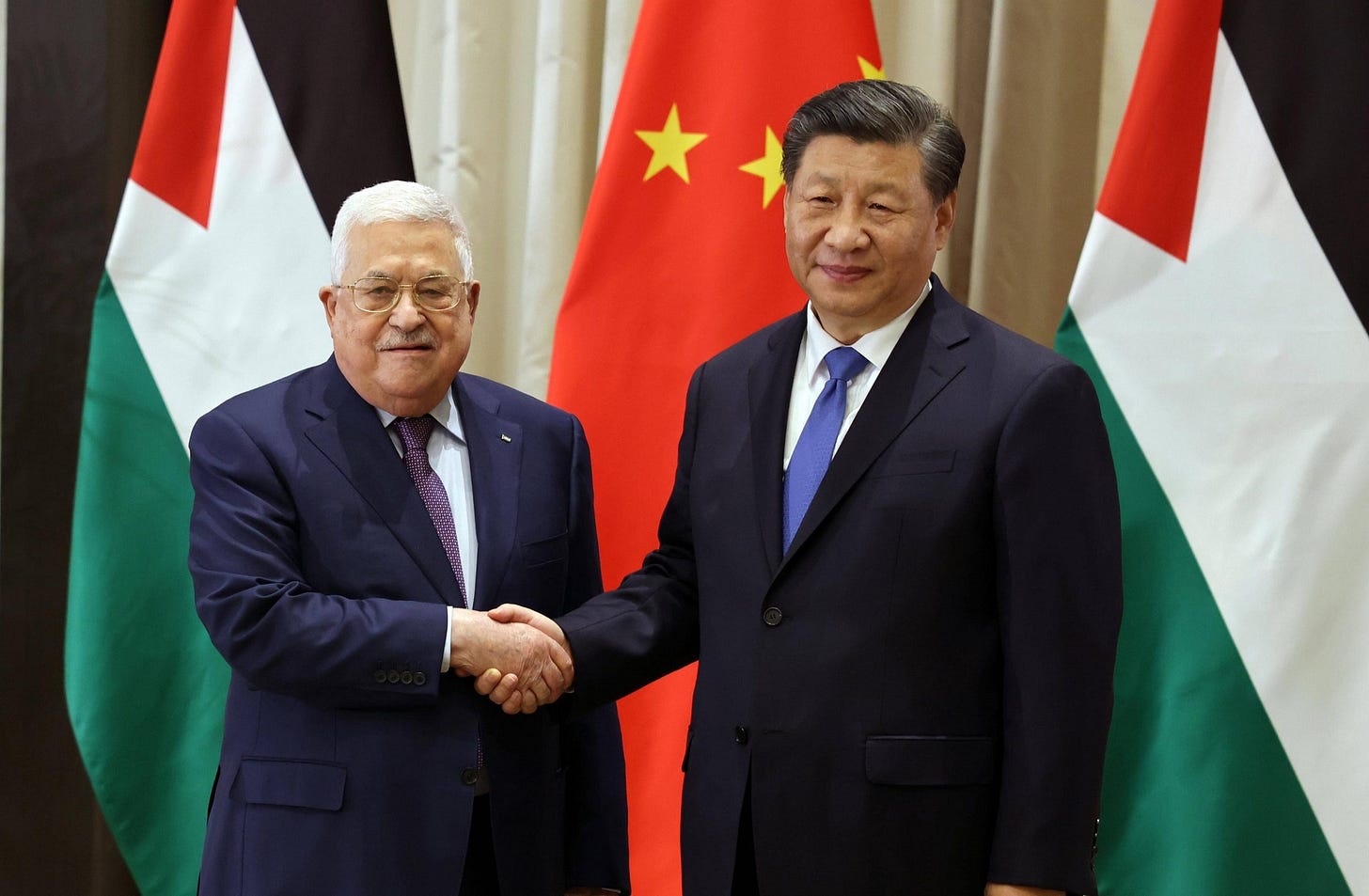China: Neither a "A Match Made in Heaven" Nor the “Axis of Evil"
Discourse Power | February 1, 2024
Dear readers,
My country is still at war, 118 days after the October 7th massacre. Hamas terrorists and their accomplices are still holding 136 Israeli hostages in Gaza, including the elderly, women, and babies. Over a hundred thousand Israelis remain displaced from their homes in the north and south of the country, and our internationally recognized sovereign terroritory is continued to be attacked by Iran-backed terrorists on six front.
Like many Israelis, I was recruited to serve in the Israel Defense Forces, which has an impact on the publication of this newsletter. I'm not sure if I'll continue with Discourse Power, but I'd like to share below an article I wrote for the Institute for National Security Studies (INSS) about the future of Sino-Israel ties, with policy recommendations.
I appreciate your interest in my work over the past two years, and you are welcome to hit “reply” to this email and leave me a message.
A previous Atlantic Council article, titled China’s bid for a new Middle East meets reality, should be of greater interest to most international readers. It discusses China's calculations in the Middle East as tensions rise.
It contends that, as with Russian President Vladimir Putin's illegal invasion of Ukraine, Russia's "no-limit" partner is once again forced to choose between irreconcilable goals that extend far beyond the battlefield: maintaining global peace and stability on the one hand, and pursuing geopolitical interests on the other. For now, it seems China has chosen the latter.
Thank you for reading,
Tuvia
China: Neither a "A Match Made in Heaven" Nor the “Axis of Evil"
As Israel navigates geopolitical complexities under the shadow of the war, is China an opportunistic partner or a potential rival in a shifting global order?
by Tuvia Gering | First published on INSS Insight No. 1820, January 25, 2024

To many in Israel, it appears that the country has been caught in the crossfire of an inter-bloc struggle for a new global order. On one side of the Iron Curtain, illiberal countries led by Russia and China appear to support Hamas and Iran's axis of resistance, which, for the first time, was activated on six fronts. Meanwhile, the "right side of history" is led by the United States.
Indeed, the dogmatic support of China and Russia for the Palestinians seems a mirror image of the firm stand of the United States on the side of the Jewish state. Tensions between the Israeli government and the White House over a judicial overhaul promoted by Prime Minister Benjamin Netanyahu have been replaced by moral clarity and unprecedented support from the Biden administration. Interspersed with the regular visits of top US officials were numerous airlifts of military aid, kinetic warfare aimed at impeding Iran-backed militias, and political support in the Security Council.
American arms transfers now span three fronts: Israel, the Indo-Pacific, and Ukraine. The latter has been fighting a defensive war against Russian attacks for the past two years. By the end of 2023, the Kremlin launched nearly 4,000 Iranian-made kamikaze drones over Ukrainian population centers. Tehran, for its part, has completed preparations to receive Russian Sukhoi Su-35 fighter jets. Now the Wall Street Journal reports that Russia intends to purchase ballistic missiles from Iran after recently beginning to use similar North Korean armaments. Not surprisingly was President Volodymyr Zelenskyy one of the first world leaders to express solidarity with Israel (along with outgoing Taiwanese President Tsai Ing-wen), despite Israel's cold shoulder toward Ukraine.
recent reports described the presence of large quantities of Chinese-made weapons in tunnels in the Gaza Strip – not unlike North Korean, Russian, and Iranian arms that have been seized since October – Israeli pundits began to see a new "axis of evil" taking shape. Some have written to warn the government to reconsider Chinese involvement in strategic infrastructure in Israel and companies, lest Beijing terminate these activities on “Judgment Day.”
Although Israel understands who is "with us," it is not as obvious who is "with the terrorists," to paraphrase former US president George W. Bush. Such a simplistic worldview of "good" versus "evil" is a recipe for poor policymaking. This is best illustrated by the original "axis of evil." The term was coined during the Bush Jr. presidency to describe Iraq, Iran, and North Korea, in what sought to provide moral support for the invasion of Iraq and the subsequent "war on terror." In retrospect, the ensuing "clash of civilizations" became the original sin for which Washington is still making amends in the Middle East.
Two decades later, when Joe Biden declares a "battle between democracy and autocracy" and Xi Jinping relates to Putin that the two strongmen are "driving together great changes unseen in a century" of a "rising East and declining West," comparisons to the Cold War come naturally. But unlike the Cold War, the opposing blocs are not as neatly divided. Rather than advocating for a global revolution, the Chinese Communist Party is now wooing liberal democracies in Europe, whereas in 2025 the White House may welcome a returning (p)resident who rejects the outcome of democratic elections.
Middle powers, from democratic India to the Kingdom of Saudi Arabia, have also transformed "non-alignment" into "alignment with everyone" and "hedging risks" into "maximizing profits." Their respective national interests demand that they not be drawn into inter-bloc competition or take sides between China and the United States, Russia and Ukraine, or Israel and the Palestinians.
The primary distinction is in the numbers. Whereas trade between the US and the USSR accounted for only 1 percent of total trade during the 1970s and 1980s, trade in goods and services between the US and China reached a total of approximately $758 billion in 2022. Xi's visit to San Francisco in late November 2023, as well as the resumption of military dialogue between the two countries in January 2024, is intended to signal that the superpowers want to keep the competition from escalating into a conflict.
Therefore, it must be argued that rather than being a member of an emerging "axis of evil," China was and continues to be an opportunistic actor that occasionally engages in "evil" behavior in the eyes of the beholder. China's sanctimonious preaching against Israel is not only a fig leaf for its systematic violations of the human rights of Muslim minorities, but also a means to isolate the United States.
In addition, its stance is not fundamentally different from criticism leveled against the Jewish state by the UN Secretary-General and most countries around the world. Even its longstanding support for the Palestinians in international organizations is now merely rhetoric; China knows that UN votes against Israel are meaningless due to the American veto, but the meager sums of humanitarian aid it sends to Gaza allow it to keep pouring money only on the Israeli side of the conflict.

China's cynical use of Israeli suffering for subversive anti-Western and anti-democratic campaigns is aided by methods developed in Russia, Iran, and North Korea, but researchers believe there is little coordination among the four. Beijing has time and again demonstrated that it is willing to abandon Tehran in an instant to secure its much more important trade relations with the "Great Satan."
The growing security cooperation between Russia and Iran (and Syria) does pose new risks, whereas the real harm by China to Israel and the region comes from its economic and diplomatic support for the Islamic Republic. With Chinese funding, Tehran can circumvent sanctions, sustain its nuclear program, and bankroll the axis of resistance in the Middle East and beyond.
The Chinese ambassador in Tel Aviv will need to respond to hard questions regarding the Chinese arms discovered in Gaza, although it is assumed that they were smuggled into the Strip via a third party, most likely from Iran. Meanwhile, the so-called "wave of reconciliation" and alternative Middle East security architecture from Beijing have been revealed for what they are: irrelevant.
American security assurances guarantee regional prosperity in the face of Iranian imperialism and religious extremism. China's inaction in the security domain is not intended to support Iran. Rather, it is the result of its limited capabilities, refusal to be drawn into the region's geopolitical quagmire, and laser-like focus on security buildup in the South China Sea in preparation for a possible occupation of Taiwan.
Policy Recommendations
On October 7, 2023, Israel confronted the face of evil, and it appears that China chose to stand with this evil at this trying time. Though anger is justified, foreign policy should come from the head, not from the gut; it is a realm of complex alternatives, between the bad and the worst. The harm that China inflicts on Israel as a "friend" pales in comparison to what it could do as a rival if not an enemy.
The restoration of Israel's economy in the shadow of the war and "the day after" is dependent on normal trade, investment, and tourism relations with the world's second-largest economy, with a trade volume of $21 billion in 2022.
This should not be interpreted as a call for "business as usual," as if nothing has happened since October 7. China's outrageous hostility in the international arena, as well as its tightening ties with Iran, have been accompanied by reports of Israeli companies facing difficulties importing tech components from China and the suspension of services to Israel by the PRC state-owned shipping giant COSCO. The first report has yet to be verified by an official source, while the second was debased by the Israeli Port Authority. Both stories, however, serve as a warning against relying too heavily on supply chains originating in nations such as China.
Similarly, reports of "Chinese control" over critical infrastructure in Israel are overblown. Between 2013 and 2022, China accounted for 6 percent of all foreign investments in Israel, and Israel has no desire to change that figure – on the contrary, as demonstrated by the upgrade of the Advisory Committee for Examining National Security Aspects in Foreign Investments in 2022, a CIFIUS-style government screening mechanism designed to strike a balance between economic, political, and security considerations.
Trade, innovation, Israel's outsized geopolitical role, and its proximity to the US all remain among China's interests in Israel. This is something that senior Chinese Communist Party officials will attest to as they continue to note the "warm relations" between the two nations. China's interest in blue-and-white technology will only grow, considering Israel's dominance on the battlefield. This will necessitate a reevaluation of the current increased supervision and regulation of the transfer of security and dual-use knowledge and technologies from Israel to China, particularly from the private and academic sectors, which have received less scrutiny.
To the extent that China will continue to heckle Israel to give itself an aura of a "responsible major power" and harm America's image, Israel has no interest in participating in Chinese "peace initiatives" or any arrangements for the "day after." China’s support for Palestinian terrorism – not least its propagation of antisemitism – must be denounced both behind the scenes and in public, even to the point of legal action. An Israeli and American effort in this regard resulted in a significant decrease in antisemitic discourse in Chinese media, demonstrating the importance of dialogue with China and establishing red lines. Security assistance to Hamas and Iran is one line that should never be crossed, as China did with its support for the Palestinian "right of return." This is a serious violation of Israeli sovereignty and national security, comparable to Israel's recognition of Taiwan.
Finally, Israel is not the only country affected by Iran's axis of resistance and radical Islam; despite its support for Tehran, China has stated that it opposes a nuclear Iran. The Abraham Accords created an opening for Israel to work with moderate Sunni countries led by Saudi Arabia, the United Arab Emirates, and Egypt on a dialogue with Beijing, which will put pressure on Tehran. A remote possibility, but not without precedent.
Discourse Power is written by Tuvia Gering, a researcher at the Diane and Guilford Glazer Foundation Israel-China Policy Center at the Institute for National Security Studies (INSS) and a non-resident fellow at the Atlantic Council’s Global China Hub. Any views expressed in this newsletter, as well as any errors, are solely those of the author. Follow Tuvia on Twitter @GeringTuvia



Wise counsel.